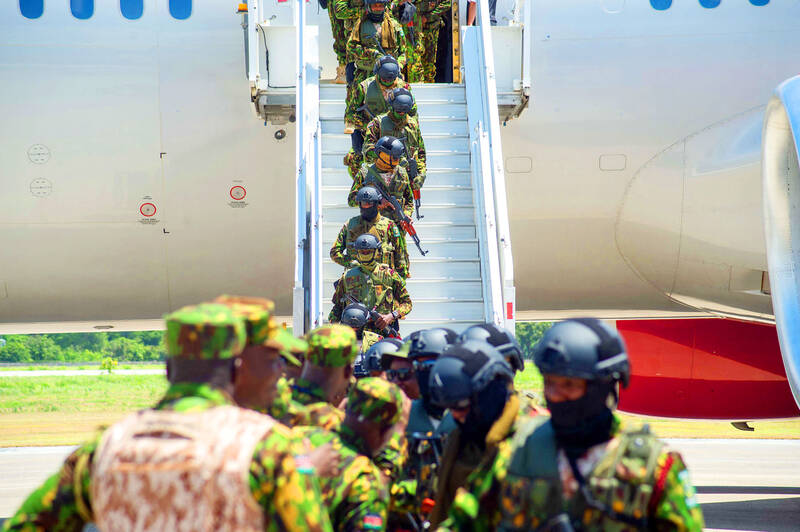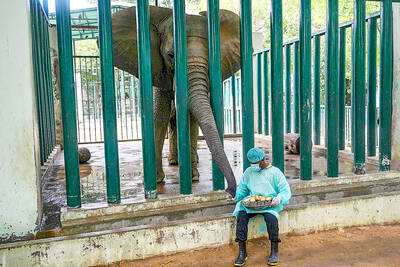More than a year and a half since Haiti’s rampant gang violence upended her life, Philomene Dayiti longs for nothing more than leaving the Port-au-Prince church where she has taken refuge with hundreds of others and returning home, but with the country in the early days of a political transition and a gang-fighting international security mission just hitting the ground, it is uncertain how long the 65-year-old — like hundreds of thousands of other displaced Haitians — still has to wait.
“The only thing I’m asking for: I’d like to go home, find a place to rest. I can’t stay here indefinitely,” Dayiti told reporters at the crowded International Primitive Church.
Dayiti lived in Bas-Delmas, a neighborhood in the capital’s sprawling metropolitan area, and eked out a living selling goods on the street.

Photo: AFP
When clashes between gangs broke out, she left her home and took shelter in the church on Delmas 19, just outside the capital.
About 800 people now reside in a makeshift camp in the church’s courtyard, surrounded by personal belongings hanging on walls or clotheslines.
Gangs had been steadily gaining ground in Haiti — with some estimates putting their control as high as 80 percent of Port-au-Prince — but the violence spiked in late February.
In coordinated attacks, armed gangs struck sites across the capital and called for the resignation of then Haitian prime minister Ariel Henry.
He stepped down and handed executive power to a transitional council, which has since named an interim prime minister and government.
However, the ongoing violence has taken a major toll, with the UN’s International Organization for Migration saying that almost 600,000 people in Haiti have been displaced, a 60 percent increase since March.
There have also been soaring levels of reported murders, rapes, looting and kidnappings.
Late last month, an initial batch of about 200 Kenyan personnel arrived in Haiti to support the police after months of delays, the first part of a UN-approved international security mission that Nairobi agreed to lead.
Roberto, who said he lived “peacefully” in a small community in Croix-Des-Bouquets, near the capital, has also taken refuge in the International Primitive Church.
“On the morning of January 21, 2023, as we went about our daily activities, we heard several gunshots. Then we saw armed bandits invade the area and take it over,” he told reporters.
The armed men “told us not to panic and that the neighborhood was now under their control,” said the father of two teenagers, who preferred to only give his first name.
He said there was shooting all night and that they ultimately fled for the sake of the children.
To avoid arousing suspicions, they left discreetly, without taking any personal belongings.
Some Haitians report that armed gangs often force residents to remain in place as human shields in the event of a police operation.
“I owned a car, a store. I have nothing left, I’ve sunk to the lowest level,” Roberto said. “To Haiti’s government leaders: While you’re blabbering all over the world, I’ve lost everything in a split second.”
Meus Lotaire, the church’s 61-year-old pastor, said it was a major task managing the hundreds of people living there, often in stifling conditions.
“There are so many people here ... it’s swarming with people,” Lotaire told reporters.
“We have all kinds of problems,” he said, adding that there is a serious shortage of toilets.
Access to healthcare is also difficult, with several hospitals closing up or reducing their services due to the violence.
At the church, many seek out the services of Alima, a non-governmental organization that operates mobile medical clinics.
The pastor praised Alima’s “colossal” work, saying it treats “hundreds of patients” there.
That includes people who do not live in the church camp, such as 20-year-old Nehemie Laguerre, whose family lives close by.
The first-time mother was visiting the clinic for a check-up with her newborn a day after giving birth, and left with medication and advice on how to care for the baby.
Reporters asked Laguerre, a resident of Bas-Delmas, what the situation was like there.
She did not want to talk about it for fear of possible retribution.

NO EXCUSES: Marcos said his administration was acting on voters’ demands, but an academic said the move was emotionally motivated after a poor midterm showing Philippine President Ferdinand Marcos Jr yesterday sought the resignation of all his Cabinet secretaries, in a move seen as an attempt to reset the political agenda and assert his authority over the second half of his single six-year term. The order came after the president’s allies failed to win a majority of Senate seats contested in the 12 polls on Monday last week, leaving Marcos facing a divided political and legislative landscape that could thwart his attempts to have an ally succeed him in 2028. “He’s talking to the people, trying to salvage whatever political capital he has left. I think it’s

Polish presidential candidates offered different visions of Poland and its relations with Ukraine in a televised debate ahead of next week’s run-off, which remains on a knife-edge. During a head-to-head debate lasting two hours, centrist Warsaw Mayor Rafal Trzaskowski, from Polish Prime Minister Donald Tusk’s governing pro-European coalition, faced the Eurosceptic historian Karol Nawrocki, backed by the right-wing populist Law and Justice party (PiS). The two candidates, who qualified for the second round after coming in the top two places in the first vote on Sunday last week, clashed over Poland’s relations with Ukraine, EU policy and the track records of their

UNSCHEDULED VISIT: ‘It’s a very bulky new neighbor, but it will soon go away,’ said Johan Helberg of the 135m container ship that run aground near his house A man in Norway awoke early on Thursday to discover a huge container ship had run aground a stone’s throw from his fjord-side house — and he had slept through the commotion. For an as-yet unknown reason, the 135m NCL Salten sailed up onto shore just meters from Johan Helberg’s house in a fjord near Trondheim in central Norway. Helberg only discovered the unexpected visitor when a panicked neighbor who had rung his doorbell repeatedly to no avail gave up and called him on the phone. “The doorbell rang at a time of day when I don’t like to open,” Helberg told television

A team of doctors and vets in Pakistan has developed a novel treatment for a pair of elephants with tuberculosis (TB) that involves feeding them at least 400 pills a day. The jumbo effort at the Karachi Safari Park involves administering the tablets — the same as those used to treat TB in humans — hidden inside food ranging from apples and bananas, to Pakistani sweets. The amount of medication is adjusted to account for the weight of the 4,000kg elephants. However, it has taken Madhubala and Malika several weeks to settle into the treatment after spitting out the first few doses they